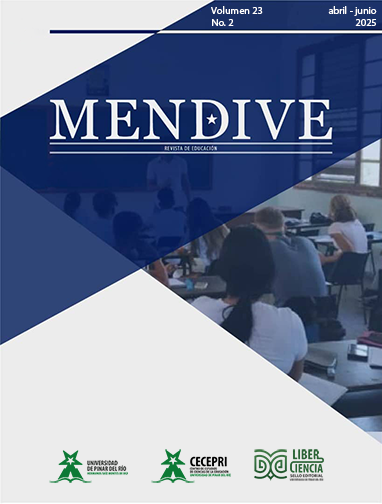Management of the mathematical culture training process in Computer Engineering
Main Article Content
Abstract
This research addresses the need to manage the development of mathematical literacy as a key element for solving professional problems with a sustainable approach. The objective was to present a diagnosis of the research object in the context of the Computer Engineering program at the Hermanos Saíz Montes de Oca University of Pinar del Río. Methods such as surveys, observations, and documentary analysis were applied to students, teachers, and administrators. The main results were inadequacies in the treatment of educational management from the institutional, administrative, pedagogical, and community dimensions, evidencing a fragmented and limited approach to the teaching-learning process of mathematics, without integration into curricula, work activities, or social outreach. Weaknesses were identified such as a lack of content sequencing, poor teacher preparation, and zero intra/extra-university promotion. The theoretical discussion highlights the importance of a comprehensive approach based on educational management principles (shared leadership, continuous improvement) and proposes a strategy for coordinating mathematical culture (description, thinking, methods, and mathematical language) with the substantive processes of the program. The research contributes to overcoming reductionist views by proposing a model that links mathematical education with the socioprofessional demands of computer engineers.
Downloads
Article Details

This work is licensed under a Creative Commons Attribution-NonCommercial 4.0 International License.
References
Alarcón Ortiz, R. A., Guzmán, Y., & García, M. (2019). Formación integral en la educación superior: una visión cubana. Estudios del Desarrollo Social, 7(3), e10. http://scielo.sld.cu/scielo.php?script=sci_abstract&pid=S2308-01322019000300010&lng=es&nrm=iso&tlng=es
Camarena, P., Loureiro, G., Gomes, E., & Bianchini, B. (2022). Pensamiento matemático y cultura matemática: concepciones semánticas en la teoría de la matemática en el contexto de las ciencias. PNA, 17(1), 55-75. https://doi.org/10.30827/pna.v17i1.21583
Faustino, A., Pérez, N., & Diéguez, R. (2014). El pensamiento matemático-investigativo desde el enfoque científico tecnológico. Multiciencias, 14(1), 80-87. https://produccioncientificaluz.org/index.php/multiciencias/article/view/16998
García Peñalvo, F. J. (2018). Los estudios de Ingeniería en Informática. Capítulo 6. En Proyecto Docente e Investigador. Departamento de Informática y Automática. Universidad de Salamanca
Mena, J. L., & Mena, J. A. (2019). La integración de contenidos científicos en estudiantes cubanos de Ingeniería Agrónoma. Indagatio Didactica, 11(1), 151-168. https://doi.org/10.34624/id.v11i1.5647
OECD. (2004). La evaluación de la "Cultura Matemática" en PISA 2003. Marco conceptual y actividades de las pruebas. Montevideo: Gerencia de Investigación y Evaluación. https://pmb.parlamento.gub.uy/pmb/opac_css/index.php?lvl=notice_display&id=47932
Sampedro, R; Rodríguez, M., & Montes de Oca, N. (2009). Sistema de tareas para favorecer la formación y desarrollo de la competencia gestionar el conocimiento matemático en los estudiantes de Ingeniería. En Memorias de XI Congreso de Matemática y Computación, pp. 67-76. Habana. Cuba. http://www.sociedadelainformacion.com/22/matematicas.pdf
Sharhorodska, O., Padrón, A., & Bedregal, N. (2018). Las matemáticas y la formación del ingeniero, como una relación simbiótica. Referencia Pedagógica, 6(2), 175-189. https://rrp.cujae.edu.cu/index.php/rrp/article/view/153
Terry Leonard, E. A., Muñoz, L. R., & Martínez, L. M. (2021). La formación de la cultura matemática y sus dimensiones. Horizonte de la Ciencia, 11(21), 165-176. https://doi.org/10.26490/uncp.horizonteciencia.2021.21.903
Terry Leonard, E. A., Martínez Casanova, L. M., & Muñoz del Sol, L. R. (2019). Exploración de necesidades para formar la cultura matemática en la Licenciatura en Educación, Matemática. Conrado, 15(Supl. 1), 202-208. http://scielo.sld.cu/scielo.php?script=sci_arttext&pid=S1990-86442019000600202&lng=es&tlng=es
Terry Leonard, E. A., Martínez Casanova, L. M., & Muñoz del Sol, L. R. (2021). Modelo didáctico para la formación de la cultura matemática. Revista Cubana de Educación Superior, 40(2). http://scielo.sld.cu/scielo.php?script=sci_arttext&pid=S0257-43142021000200015&lng=es&tlng=es
Tristá, B. (2001). Administración universitaria: La gestión en las universidades, Universidad de la Habana.


